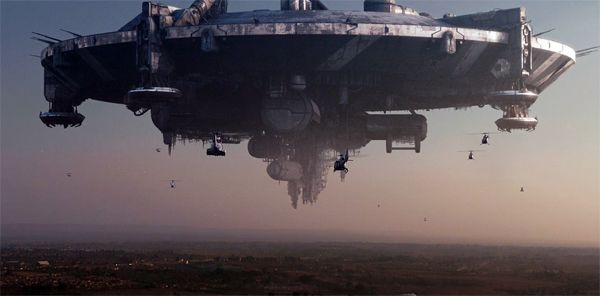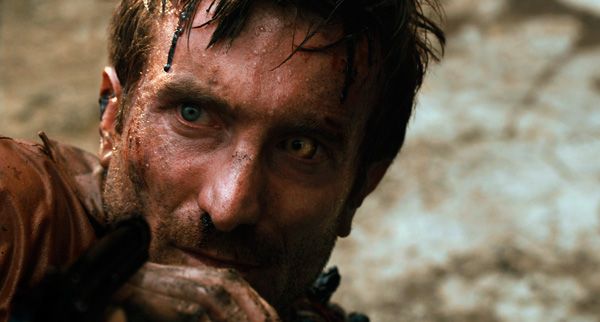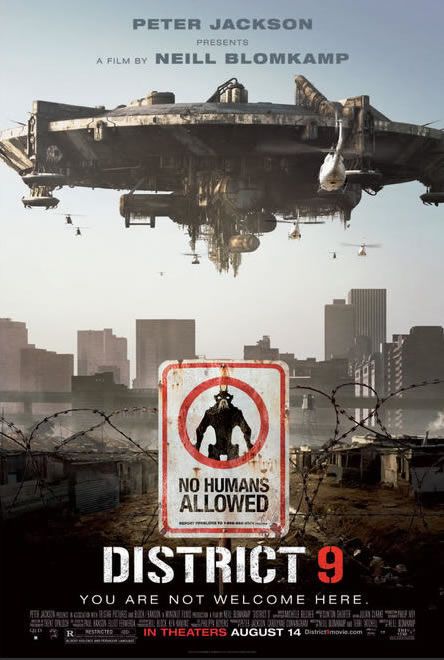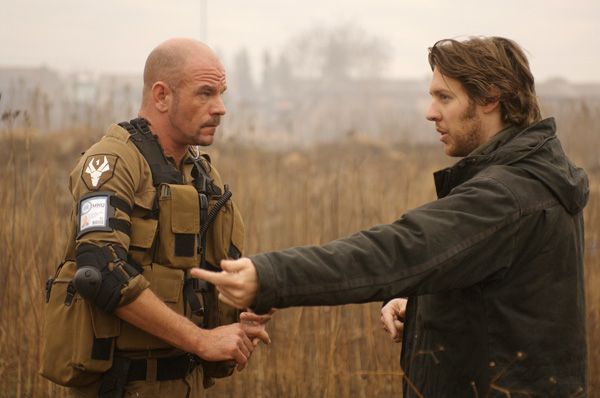The filmmakers and marketing team of "District 9" have gone to great lengths to keep the plot of the film obscured in ads and trailers for the film. You know it involves aliens. You know it involves a district in Johannesburg, South Africa. At most, you know the aliens are stuck on Earth and want to go home.
There's only one more thing you should know: "District 9" is one of the best films of the year and to read further in this review without seeing the film would only spoil an experience where you can be one of the first in the door to see a picture that will rely on word of mouth to succeed. It's best to go in cold and I can't figure out a way to write this review without giving away so much of this film. Instead, I encourage you to come back to this review after you've seen "District 9" and see how my thoughts on the film matched up with your own.
[Major spoilers ahead]
Hopefully, you've now seen the film and while I'll go through major plot points you already know, I want to explain them in more detail and analyze them where applicable. Obviously, at the end of this review you can judge whether I succeeded at that or not.
"District 9" is a slum in Johannesburg that houses all of the aliens who arrived on a spaceship in 1982. Weak, malnourished, and unable to repair their ship, we transported the aliens to live on Earth but quarantined them in their own section. The aliens are not necessarily our prisoners but since they are refugees of a sort, their lives are run by Multi-National United (MNU) which is not a government agency but a private contractor. Of course, MNU's concern isn't the well-being of our extra-terrestrial visitors (they are not allowed to make a phone call of any kind), but to take from them every advanced technology they can harvest while making sure that District 9 is nothing more than a slum where the residents are left to fend for themselves and have no other recourse than to work with criminals and warlords in order to survive.
In the present day, we meet Wikus Van De Merwe (Sharlto Copley), a man who is the very definition of an "empty suit". A genial sort, Wikus tows the company line, has no respect for the aliens (which are derisively called "prawns" due to their appearance), and is the wimpy nerd to the MNU's private military of jocks. Wikus is put in charge of relocating the residents of District 9 into a new encampment. It's also a means of eviction where the aliens will have to trade their shacks for tents which provide even more cramped and cruel living conditions. But it's not that Wikus is a bad man or even a heartless man. He loves his wife, is well-liked by his co-workers, but he carries the popular mindset that since the Prawns (a name that the aliens even take for themselves which is interesting because it means they've lost most of their culture and identity since becoming stranded on Earth) aren't even human, then they can be herded around like cattle.
I don't even need to keep talking about the exposition and set-up (although I like to since I enjoyed the film so much) because most viewers will immediately spot the surface commentary on modern history. The clearest reference is to Apartheid which, although considered over in 1994, still shapes the cultural and political landscape of South Africa to this day. But you can see the parallels just as easily in the conflict between Israel and Palestine or really any conflict of the past 150 years where two factions operated in the same space and one used its power to dominate and control the other.
Except the Prawns have no land. They need to be on our land simply to survive. But as I said before, keeping them here isn't a humanitarian effort. MNU wants their technology; most notably, their weapons which are highly powerful and destructive but only Prawn DNA can activate them.
At this point, some may have already wondered: Why isn't the International community involved? Why is everyone in this film South African? It's hard to believe that just because the spaceship landed over Johannesburg, rather than New York or London or Paris (or any other major city that aliens traditionally like to visit and then destroy in movies) that other countries wouldn't step in to study and possibly even protect the aliens.
Except in another piece of insightful commentary (of which this film provides for numerous issues and will hopefully have people talking about the various issues and themes presented just beneath the surface of the exciting narrative), MNU is not a country. It is a corporation and thus practically responsible to no one. In the modern era, corporations are bulletproof, immune to taxes, sanctions, wars, and as we've acutely witnessed in the past year, even their own implosion. Corporations like MNU don't fight the government, they use it. Maybe an event as massive as first contact would push the International community past MNU's defenses, but as with most refugees, the negatives for a country always seem to far outweigh the positives. And thus we come back to the existence of District 9.
Before the film moves on to its heavy science fiction angle, it shoots the first act primarily as a documentary. We see news footage of the aliens landing, we see interviews with those (mostly academics) who support the rights of the aliens and those (mostly MNU workers and Johannesburg citizens) who feel the aliens must be walled off from humanity to ensure the best conditions for both species or just return to their ship and leave. The ship continues to hover over Johannesburg, overshadowing the city (not subtle symbolism but enjoyable nonetheless). As the "documentary" of the first act winds to a close, we follow Wikus through the shacks of District 9 as he attempts to evict the residents, as witnessed by a nameless cameraman. Everyone knows the camera is there and attempt to speak to it when they want to look good (especially Wikus who is almost channeling Murray Hewitt from "Flight of the Conchords") and then shove their hand into the lens and ask for editing at every embarrassing moment. The only time you don't see the camera is when we cut to the scenes only involving the Prawns. The Prawns don't notice the camera because there is no camera for them. This is the real world and then it hits you: this isn't our story; it's theirs.
Not only is the documentary a brilliant narrative device for both exposition and the dichotomy between the Prawns and Humans, but it's a cinematic necessity due to the film's $30 million budget. Also, you should keep in mind that all the aliens are completely CGI and there are no practical effects in their design. While you'll obviously notice that the aliens are computer generated, "District 9" is a shining example that CG used well is always better than the most expensive CG which calls attention to its price tag rather than the plot or characters. The documentary approach helps to ground the Prawns in reality and the hand-held camera, whether it's in the visual documentation or the narrative reality, makes you not look at the Prawns so closely that you're removed from the film before it even begins. It is also our view of the aliens and creates another wall between us and the Prawns. Even with the interviews of compassionate supporters of the aliens, there isn't a single interview with a Prawn to describe their plight. Whether it's by choice of the unseen documentary filmmaker or the enforcement of MNU, the Prawns do not have a voice in our story.
But even with all that removes the Prawns from a relationship with both the humans in the film and the audience, director Neill Blomkamp takes it another step further with the design of the aliens. There's a reason they're called "Prawns" and they are in no way cuddly. In addition to looking like their crustacean namesake, they speak in a language that sounds like a collection of clicks and burps. Let me put it another way: you will not be seeing them in a bike basket helping a young boy soar through the air on Halloween night. Even if we don't side with the actions of MNU, it's hard to feel compassion for the aliens when they're removed by both by the documentary and their less-than-charming appearance.
As the first act nears its close, we finally meet individual aliens outside the documentary. A Prawn named Christopher Johnson (probably not his actual name) has spent the last twenty years creating the necessary materials to revive the ship and get him and his son off Earth and eventually rescuing all the aliens stranded in District 9. With Wikus at the door of his hideout about to perform a search which will kill twenty years of work, Christopher trusts a friend to hide a cylinder of fluid while trying to sneak out to get avoid capture by the MNU. While his friend manages to succeed in that task, it goes sideways afterwards. Christopher's friend is prawn-handled by Wikus' personal MNU guard and there's an altercation where Wikus breaks his arm and the friend is killed (I may have put this event out of order but that's just another reason why I need to see the film again). Wikus clearly feels guilt about this turn of events but seems more concerned with looking tough in front of the camera and insists on just getting a medic to bandage up his arm so he can move on with his important and momentous task.
Soon after the altercation, Wikus comes knocking at Christopher's home with an eviction notice, not as a personal vendetta but as the impersonal empty suit come to enforce his newfound and underwhelming powers to relocate all the aliens into the new district. It's in this moment we see Wikus at his most cruel as he uses his petty bureaucratic powers to threaten Christopher to sign the eviction notice or else his son will be taken by child services. In this way Wikus is the epitome of the most universal kind of human evil. It is not a malicious evil but one that is not even considered wrong by its participants. The Prawns are not human. They may have to live like humans on a human planet imprisoned by humans, but despite their unlovable exteriors, they are humanoid with two arms (although there are little vestigial ones come out their chests and torsos), two legs, a head and they can be killed just as easily as humans. We can even manage a rough form of communication. But since the Prawns have been segregated and forced into submission by humans, people like Wikus don't think they're being cruel. They think they're being kind and reasonable and that the Prawns should be grateful for our "benevolence".
At this moment, Christopher does everything he can to protect his son and protect his project by complying with all of Wikus' demands. Christopher also tries to play it smart by understanding the laws of District 9 and manages to earn another 24 hours by turning Wikus' bureaucracy back at him. Wikus is still allowed to search Christopher's home and he marvels at all the technology Christopher has put together. Wikus then comes across the fluid cylinder and as he examines it he is sprayed a black liquid. Again, Wikus toughens up in front of the camera even though it's clear that the responsible task is to immediately go to MNU's medical division and place himself in quarantine. But this isn't some stupid moment like at the beginning of "The Invasion" where Jeremy Northam plays a scientist-officer guy who just picks up a strange meteorite even though everyone around him is wearing haz-mat suits and then cuts himself on the strange meteorite before carrying on with his day. That's not Wikus. At this point we know and understand Wikus and while he's acting irresponsibly, he doesn't want to give up his modicum of power, a power that he's clearly lacked for most of his life. Even afterwards, when his fingernails start coming off and black ooze is coming out his nose, Wikus doesn't reveal what's happened to him and fears not only himself but what may happen to him if his condition is revealed.
At this point, the documentary style has mostly phased out of the picture but it's never completely gone. We periodically hear from talking heads and we learn that Wikus did something and some don't understand it and others assign him motive. We now know that all these interviews are happening after the events of the narrative and we're witnessing both a prologue and an epilogue spliced into the main storyline. As the narrative continues, the documentary style occasionally appears through the objective lens of a security camera and later on news footage. This brilliant narrative structure is one of the many reasons I absolutely love this film and those who don't will vex me. I shall be vexed.
It doesn't take long for Wikus' condition to finally reveal itself as he vomits black liquid while cutting a cake at his own surprise congratulatory party. Rushed to the hospital and his sling removed, Wikus and the audience learn that his arm has transformed into the arm of a Prawn. Naturally, he freaks the hell out before being sedated. He then begins a horrific odyssey as he's taken prisoner by MNU and forced to participate in dissections, drillings, and most importantly for MNU, to see if he can operate alien weaponry. He can and at that moment Wikus knows they're going to pull him apart to try and duplicate his transformation since we've learned that digesting Prawn body parts or injecting Prawn DNA is useless in activating their weaponry. But before Wikus receives confirmation of his fate, his last target when testing the weapons is not a test dummy but a defenseless Prawn, shackled and with a big red "X" on his chest. Wikus won't do it. He knows it's wrong and that for all his bureaucratic abuse and disrespect towards the Prawns, he knows this is taking another life. We're captivated by the fear and emotional torment we can see in his eyes. And then, like Wikus threatened Christopher's child, MNU threatens to capture and dissect Wikus' wife, and then they wrap their hand around Wikus' and he pulls the trigger, obliterating the Prawn in a bloody mess around the test chamber.
Finally, at the moment when he's about to be cut into tiny pieces, Wikus manages to escape and he knows the only place he can go is back to District 9 and to Christopher. He's now eating the Prawns' food/drug, cat food and the transformation is spreading past his arm and it's only a matter of time before he's completely transformed into a Prawn. He knows that Christopher is the only one who has the power to change him back and it isn't because Wikus wants his old job or his old life back. He just wants to go back to his wife, Tania (Vaness Haywood). Tania is his life and his love for her is the refuge of his humanity.
So Wikus strikes a bargain with Christopher: Wikus gets the fluid back from MNU and in return Christopher will reverse the transformation.
I'm going to stop going on about the plot and will just hit a few more major points about the film in the hopes that your eyes haven't glazed over.
This is NOT a "Walk a mile in someone else's shoes/see how the other half lives"-kind of story. Those elements are there but it's not Wikus' motivation. He doesn't care about the plight of the Prawns or if they can return to their ship. Wikus is only interested in one thing: survival. He's not trying to be a hero or fulfill some kind of cosmic destiny long fortold in a sacred prophecy of the alien race. He's just a regular guy who finds himself into extraordinary circumstances and it's not out of the goodness of his heart that he helps Christopher. Wikus only wants to become human again and go home to his wife.
This motivation makes the emotional climax of the film hit harder than any of the films absolutely brilliant kills at the hands of the alien weaponry. As Wikus and Christopher attempt to make their way back to Christopher's home so he can complete his plan to return to the mother ship, Wikus makes a choice. Wikus can turn around and use a biomechanical mech he's acquired to fend off the MNU military raining down on him but Christopher probably won't make it back home alive. Or he can give his life to get Christopher to safety. Wikus, a man who has done everything to this point to ensure his own survival, both professional and then primal, decides to save Christopher. The man who was an empty suit at the beginning of the story is now in a suit that is not only extremely powerful, but is power used for a selfless cause. There aren't many sci-fi/action films that provide that kind of satisfaction.
And we've seen blockbuster films this summer that try to blend that mix of quasi-science fiction and high-octane action and in one case it worked ("Star Trek") and in others it completely and utterly failed ("Transformers: Revenge of the Fallen" and "Terminator Salvation"). These three films, with their major stars, mega-franchises, and massive budgets aren't as good as a $30 million film from South Africa with no stars, a debut feature film from an unknown director, a plot purposely kept under wraps, and calling out Peter Jackson as the producer as the only easy marketing. Think on that for a while and then let your jaw drop.
Every penny of that budget is on screen. I'm always noting the best kills of the year (I'm sick like that) and when it comes to "District 9" all I can say is "All of them." Watching Vikus or Christopher make an MNU soldier's head explode into a bloody pile never gets old. You think it would around the 11th or 12th time, but nope. It's enjoyable every time, especially when Blomkamp splatters a little blood on the camera to great effect.
What else can I say about Neill Blomkamp? He was originally slated a few years ago to direct a film based on the popular videogame series, "Halo". I hope every person who sees "District 9" is relieved that never happened. It's not because Blomkamp couldn't do it. It's just that it would be a waste of his time and talent because he's clearly better than the material. Why lock himself into an unoriginal world with an uninspired storyline and nothing but rabid fans to hound him along the way when he could do a movie like "District 9" instead? I'm not worried about Blomkamp being good enough to handle any material. Now my concern is whether or not the material is good enough for him.
Then there's Sharlto Copley as Wikus and it's a bigger breakthrough performance than "Zach Galifianakis" in "The Hangover" because at least there were folks who were already aware of Galifianakis. I don't think anyone other than his friends and family knew the name "Sharlto Copley" before this film but once "District 9" comes out, everyone who sees it will be running to Copley's IMDb page to check out his previous work and then they'll be dumbstruck; he doesn't have any. This isn't only his feature film debut, but it's his first professional acting job in film or television. I'm still trying to process that one.
Finally, I've heard a few complaints about the lack of a singular antagonist but I believe those concerns are incorrect because to the Prawns, we're all antagonists. We're all faceless bureaucrats or sadistic soldiers or just heartless thugs all profiting off their suffering. We're not trying to find their deeper motives because they're of Wikus' old world of self-interest and blissful ignorance. Humans never have to make a hard choice because they've already made all their choices when it comes to the Prawns. And it's not to say that every human in the world is bad just as every alien in District 9 is good.
I thank you for seeing "District 9" and I'm thankful that we still have films like "District 9", especially when every summer feels over-populated with sequels and adaptations and remakes. And I'm personally thankful to you, dear reader, if you read this ridiculously lengthy review of "District 9".
Oh, crap. I forgot one more thing: I want to take Christopher's adorable son home with me.
Rating ----- A




.jpg)
.jpg)


